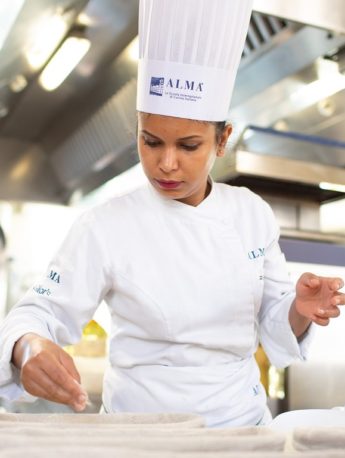
What does happiness tastes like to you?
I don’t need something more than the simple salt, acid, fat complexity which feels very smooth to my palate. In concrete, I would say risotto allo zafferano, because I love both risotto and saffron, an ingredient that is quite common also in Indian cuisine.
What is your background?
Back in India, I graduated as an engineer in 2009 and I had worked in that field until 2014, when I decided to switch to cuisine. I started in a French cooking school with a bread making course and I started to supply cafes, my son was still young and I wanted to focus on him. However, when he grew up, I felt I needed to learn more and, due also to the help I got from my family, I decided to start a new course. I have always wanted to learn Italian cuisine, and I had been told by a few Italian friends some years before that ALMA was the place to go. I started to study its philosophy and courses, shaped by talented Italian chefs according to the principles by Maestro Gualtiero Marchesi.
Tell us about your ALMA experience.
I was slightly worried before moving to Italy, because I did not know completely the country. As a consequence, in order to avoid offending or not being prepared, I read about its geography and its culinary culture. This was really helpful because I could understand better each lesson and example made by the teachers and the chefs. I enjoyed my experience from many points of view, especially due to the fact that I have been living it from both the student and the teacher perspective. The former was an incredible period of learning and practicing, the latter is even better: I learn every day from others, from my own work and mistakes and I can also teach, a moment I was not used to that fills me with joy.
After the Italian Culinary Program, you faced the internship period.
I started with chef Paolo Lopriore at his restaurant Il Portico in Appiano Gentile. I am very thankful to the School that assigned me to this place because I was dreaming about working with this chef. I learnt many things from chef Lopriore, he challenged me to cross my limits both physically and mentally, for him it did not matter my gender or nationality, in his opinion a chef is a chef: if you love cooking, he teaches you how to. He took me by his side and he taught me not just food, different techniques and how to balance and understand them, he has a very scientific approach towards food.
Chef Valeria Piccini from Da Caino restaurant in Montemerano, an institution of Italian cuisine. She is one of the strongest women I have ever met and you can feel this even in the dishes she cooks every day that have allowed her to keep two Michelin stars for more than 20 years. She was very interesting, in two weeks she directly put me in the line, she wanted me to work and prove myself, if I could not do something, she would have showed it to me with the precision of a Michelin starred chef.
What made you fall in love with Italy?
ALMA is about cuisine, is about food. A food culture grows here, and this concept comes from the Italian tradition. I come from another part of the world and that is my peculiarity, I am able to contribute, I add value because I blended here bringing my experience taking some parts from here as well that I want to take back to my country and my family. It is a gastronomical cultural exchange.
What is your most beautiful moment in ALMA?
I would say when I prepare something and it comes out perfectly and I have this moment of pure happiness! Or when I am working in the Mater Restaurant of the School along with the student and the service goes smoothly I am very excited as well.
What are your future projects?
I would love to start something that is sustainable, both economically and environmentally. That is another reason why I do not want to leave Italy yet, I need to learn more in order to avoid mistakes when I will start my business in India. I would like to run a medium to heavy scale production company, focused on bread and pasta. Following HACCP standards and keeping a very high quality to supply a copious amount of restaurants.
